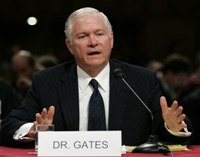U.S. Defense Secretary urges Russia to drop Russia to plans to develop defenses in Europe against nuclear missiles
U.S. Defense Secretary Robert Gates on Monday urged Russia to drop its opposition to American plans to develop defenses in Europe against long-range nuclear missiles, but the Russians refused.

"We face new threats that require new strategies for deterrence and defense," Gates said in a prepared statement delivered with Russian Defense Minister Anatoly Serdyukov seated beside him. "We invite Russia to join our defensive endeavor as a partner."
Serdyukov, however, made clear that Moscow is opposed, and he gave no hint of reversing course.
"The Russian position with respect to this issue remains unchanged," Serdyukov said.
"We do believe that deploying all the strategic elements of the ballistic missile defenses is a destabilizing factor that may have a great impact upon global and regional security," he added.
Later, after meeting separately with President Vladimir Putin and other top Russian government officials, Gates told reporters that he sensed more flexibility than Serdyukov's statement might have indicated.
"I felt like we made some headway," Gates said at a news conference at his Moscow hotel with a small group of American and Russian reporters. When asked about the apparently categorical rejection voiced by Serdyukov, Gates said, "I had the impression that that statement was prepared before" the talks, although it was delivered afterward.
The Bush administration hopes a series of high-level meetings this week will yield the first sign of a crack in Russia's opposition to U.S. proposals to build anti-missile bases in Poland and the Czech Republic.
The bases would be meant to provide protection in Europe from a long-range nuclear missile launched by Iran a threat that U.S. officials say may be fast approaching but that the Russians say is exaggerated.
The dispute has grown into a major irritant in U.S.-Russian relations.
Gates, on his first visit to Russia since taking office last December, also met Monday with First Deputy Prime Minister Sergei Ivanov, who had been defense minister until Seredyukov took over in February. Gates was gauging their initial reaction to a new set of U.S. proposals designed to soften Russian objections.
"It's nice that you accepted the invitation and that President Bush sent you so quickly," Putin said in greeting Gates at the Kremlin. "We have planned a conversation with him after our meeting." The two did not discuss substantive issues during a brief exchange before reporters were escorted from the meeting room.
Russian-American relations are very important, Gates said, adding, "There is a great deal we can accomplish together."
The proposals, presented quietly last week in Moscow and at NATO headquarters in Belgium, include sharing data collected by U.S. sensors to provide early warning of ballistic missile launches, cooperation on missile defense research, and joint testing of the building blocks of an anti-missile system, according to an administration official traveling with Gates. Two officials on the trip from Washington discussed the proposals on condition they not be identified because the talks had not yet begun.
One official acknowledged that previous U.S. proposals for such cooperation had fizzled, and that it likely would take time and multiple meetings and consultations to see if the Russians will change their mind.
"I don't think we expect to solve this problem on this trip or to get even a definitive answer from the Russians necessarily on this trip," one official said. "I hope we get at least a preliminary response."
Later this week Secretary of State Condoleezza Rice is due to attend a NATO meeting in Norway that is scheduled to include a session with Russian officials on the missile defense controversy and other issues.
The administration is consulting with Poland on hosting a U.S. base with 10 missile interceptors, and is talking to the Czech government about hosting a radar system used to track hostile missiles in flight. Russia has long objected to a U.S. military presence on its periphery; Poland and the Czech Republic were part of the old Warsaw Pact that faced off against U.S.-led NATO during the Cold War.
Washington has repeatedly insisted that an anti-missile system in Europe would not threaten the viability of Russia's vast offensive nuclear missile arsenal and would offer it some protection from a potential Iranian attack.
Subscribe to Pravda.Ru Telegram channel, Facebook, RSS!


